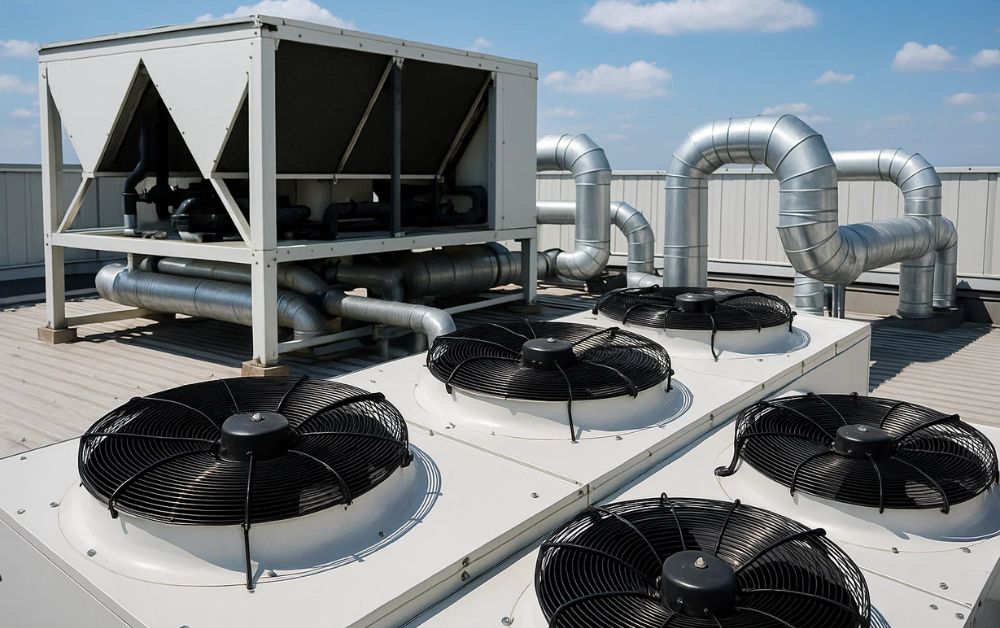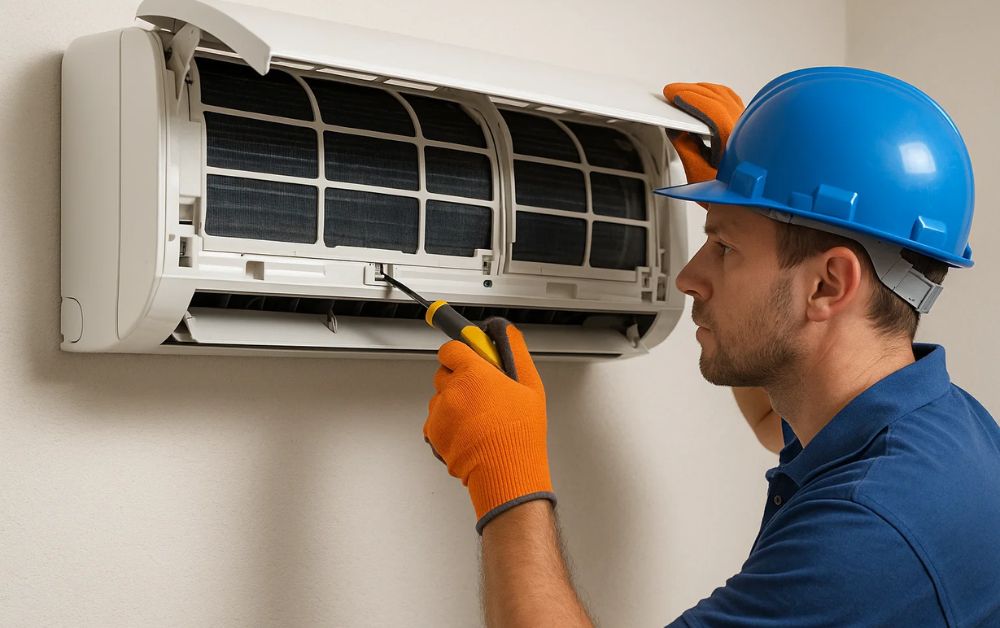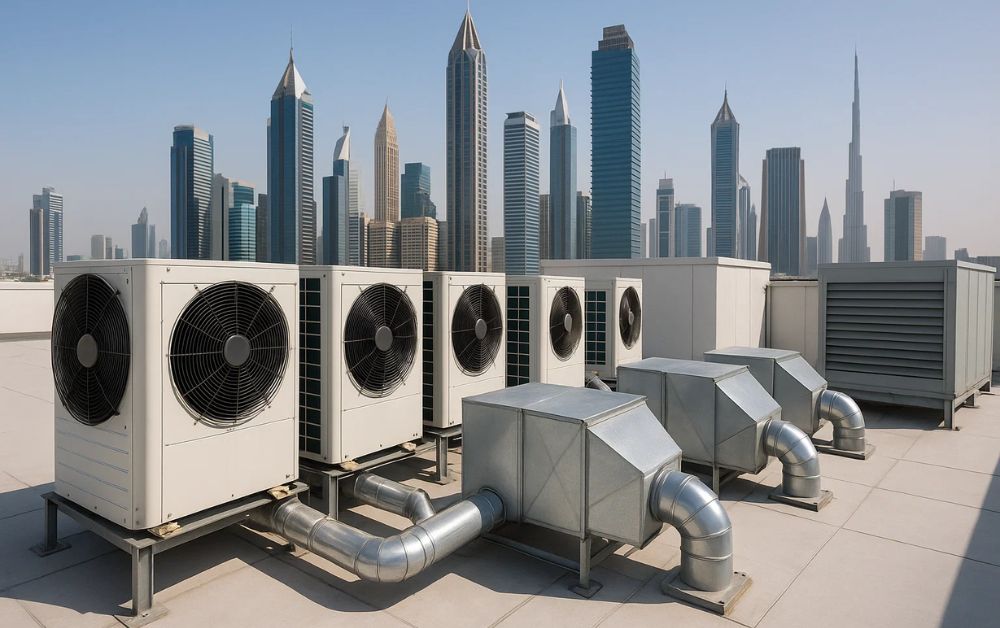Blog Details
- Home
- Blog Details

Residential vs Commercial HVAC in the UAE: What’s the Difference?
In the rapidly expanding urban hubs of the UAE, climate management is not a want — it’s a need. With blistering summers and ever-changing indoor requirements, both residential and commercial buildings depend on effective HVAC systems to provide comfort, productivity, and safety. However, while HVAC (Heating, Ventilation, and Air Conditioning) systems may serve the same fundamental purpose across property types, the design, functionality, and implementation of residential and commercial systems vary significantly. In this blog, we’ll explore the key differences between residential and commercial HVAC systems in UAE and why choosing the right system is crucial for long-term performance and energy efficiency.
Being one of the top HVAC solution providers in the UAE, CBE Gulf is an expert in designing, installing, and servicing custom-made systems that address the specific requirements of residential and commercial premises.
Learning About the Fundamentals of HVAC Systems
Before we discuss the differences, let’s first familiarize ourselves with what an HVAC system does. An HVAC system is meant to control indoor temperature, humidity, and air quality through heating, cooling, and ventilation. Such systems are critical in the UAE, where high temperatures and fast construction require high-performing and dependable solutions for controlling the climate indoors.
Now, let’s take a look at how residential and commercial HVAC systems vary in design, operation, and application.
1. System Size and Complexity
-
Residential HVAC Systems:
Residential HVAC systems are small and uncomplicated. They are meant for individual houses or tiny apartment units. The most widespread models found in houses are split air conditioning systems, ductless mini-splits, or villas with centralized ducted systems. Such systems are mostly compact, simple to install, and involve little customization.
-
Commercial HVAC Systems:
Conversely, commercial HVAC systems are far larger and more sophisticated. Commercial systems are designed to operate multi-story structures, offices, shopping centers, warehouses, and manufacturing facilities. They need complex zoning, ductwork, rooftop units (RTUs), variable air volume (VAV) systems, and sophisticated control systems. Additionally, commercial systems have to meet industry standards and are usually sized and designed based on the building’s size, occupancy, and intended use.
2. Design and Installation
-
Residential Systems:
Design and installation of home HVAC systems in the UAE are mostly simple. The configuration includes fewer elements, less complex ductwork, and usually one or two cooling zones. Installation takes less time, and system design can be done according to similar property types on an identical standard.
-
Commercial systems:
Commercial HVAC systems require a very detailed design process, with the involvement of HVAC engineers and consultants. Parameters such as heat load calculations, air pressure, occupancy changes, and usage patterns need to be taken into account. Installation may take weeks or months and will often need to be integrated with Building Management Systems (BMS) for centralized control. Organizations such as CBE Gulf have a crucial role to play in controlling such complicated installations.
3. Energy Efficiency and Load Management
-
Residential HVAC:
Residential energy use is relatively steady and predictable. Although systems today have energy-saving technologies such as inverters and programmable thermostats, load management is typically not an issue except for substantial residences.
-
Commercial HVAC:
Commercial systems need to deal with fluctuating loads as a result of varied occupancy, equipment operation, and building orientation. Such systems tend to employ sophisticated technologies such as chillers, VRF/VRV systems, and intelligent thermostats to maximize energy utilization. Load balancing, peak-demand management, and proper zoning are vital attributes for UAE commercial HVAC solutions.
4. Maintenance and Service Requirements
-
Residential HVAC:
Homeowners can maintain routine maintenance activities such as filter cleaning and seasonal maintenance with ease. House systems contain fewer parts, meaning lower maintenance costs and less frequent professional maintenance.
-
Commercial HVAC:
Due to their scale and complexity, commercial systems require ongoing professional maintenance, frequent inspections, and often, 24/7 monitoring. Downtime in commercial systems can result in significant losses in productivity or revenue, so reliable maintenance from specialists like CBE Gulf is critical to ensure optimal performance and lifespan.
5. Cost Implications
-
Residential Systems:
The initial cost and operating expense of residential systems are relatively low. Replacement parts are easy to find, and energy consumption can be managed with energy-efficient equipment and programmable thermostats.
-
Commercial Systems:
Commercial HVAC installations are a substantial investment and entail greater capital outlay because of system size, exceptional design, and regulatory requirements. Still, properly designed systems can provide significant long-term energy savings and automation benefits.
6. Zoning and Control
-
Residential HVAC:
Most home systems provide minimum zoning—usually a thermostat for the whole house or one per floor in a larger house. Control is minimal but sufficient for the smaller space.
-
Commercial HVAC:
Zoning is essential in the commercial environment. Various departments, floors, or rooms might have different temperature and humidity requirements. Commercial HVAC systems often integrate with intelligent BMS to enable central control, remote monitoring, and fine-grained scheduling.
7. UAE Regulations and Compliance
In the UAE, HVAC systems, especially in commercial settings, have to comply with regulatory standards of energy efficiency, indoor air quality, and sustainability. These regulations provide for lower carbon footprints and maximum resource utilization. Residential systems, though regulated, are generally less complicated in terms of compliance.
Conclusion: What’s Best for You?
Selecting between residential and commercial HVAC systems in the UAE is solely based on your property type, usage needs, and long-term ambitions. Residential systems are best for small-scale, predictable use with low levels of complexity. However, commercial HVAC systems are designed to serve larger, more dynamic spaces with complex requirements.
Regardless of your project size or industry, it’s crucial to work with an experienced partner who understands the local climate, infrastructure, and compliance requirements.
CBE Gulf, a reliable provider of HVAC solutions in UAE, provides complete residential and commercial HVAC design, installation, and maintenance services. CBE Gulf commits to quality, efficiency, and customer satisfaction while guaranteeing that each system is specifically designed to meet your requirements—cooling a small villa or an office building skyscraper.
For customized HVAC solutions that provide reliability and comfort all year round, get in touch with CBE Gulf today.
Popular Feeds
-
Residential vs Commercial HVAC in the UAE: What’s the Difference?
September 7, 2025



Leave a comment